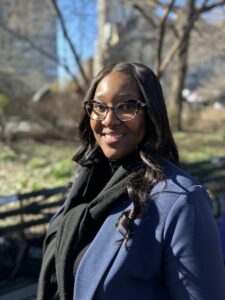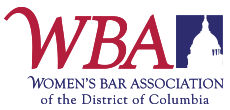WBA celebrates Black History Month by celebrating the Black members of our community.
Sonia Williams Murphy is a Trial Attorney at the U.S. Department of Justice. She was WBA president in the 2016-2017 bar year, and presided over the Association’s Centennial Celebration.
Sonia joined Justice after over a decade in large, international law firms. Sonia tells us, “As a litigator, joining the DOJ was by far the best professional decision I have made to date. I have argued several cases before the Federal Circuit and have tried several cases before the U.S. Court of Federal Claims and the U.S. District Court for D.C. Being in a courtroom is still both nerve-wrecking and gratifying all at the same time. Jury trials are my favorite!”
When she is not working, Sonia likes to hang out with her children: her daughters who are 21 and 15, and her nephew, who is 18. They keep me young and on my toes. Her youngest plays club volleyball, so you can usually catch Sonia screaming loudly at a volleyball tournament on the weekends.
Sonia and her family spend a significant amount of time advocating for LGBTQ+ youth. Fun fact: Sonia and her nephew are featured in an ABC special that is available on Hulu called: “Our America: Who I’m Meant to Be.” You can check out her linktree to learn more about her personal advocacy and to get involved.
What inspired you to join the WBA?
I was invited to join the WBA by a past president, Karen Lockwood, who was a partner at my law firm at the time. I was a junior associate and was looking to build connections within the DC legal community. The WBA welcomed me with open arms. I started as a co-chair for the Diversity Committee.
How did your community growing up shape who you are now?
Growing up, my family was very active in our church, the historic Metropolitan Baptist Church of Washington, DC. We attended services weekly and once a month, our Pastor, Dr. H. Beecher Hicks, Jr., had the youth lead the service. We did all of the speaking assignments (welcome/prayers, etc.). Looking back, I believe that time speaking in front of large numbers of people in church prepared me for a career in litigation.
Our church was also big on social justice, which had a profound impact on me. When Nelson Mandela visited Washington, DC, Pastor Hicks wrote letters to our schools so all of the young people could be on hand to meet and take pictures with Mandela. Those are the memories of my youth that stick with me and that strongly influenced who I am today.
What motivated you to enroll in law school?
I was always analytical. As a child who liked to debate, and wanted answers to tough questions and an opportunity to be heard, several adults in my life – including my parents, teachers, and counselors – would say “you should be a lawyer.” So, I just did what everyone said I should do. Now, I tell people all the time, be careful what you say to children – they’re actually listening!
I didn’t know a soul who was a lawyer, but I liked Claire Huxtable’s character on the Cosby Show, and I loved when she would be in the courtroom, or when she would do courtroom or legal antics with the family.
What advice would you give to a Black law student who aspires to be where you are now?
Focus on school, first and foremost. Do well in your classes, so you have more opportunities upon graduation. After that, my advice would be to “network, network, network.” Joining the WBA is a great place to start meeting people!
What does Black History Month mean to you personally, and why is it important to celebrate it?
I see Black History Month as an additional time to reflect on our past, and to celebrate our achievements, recognizing that there is much work to still be done for equal rights. And while a dedicated month is great, these are reflections that we can and should be doing year-round.
What progress or positive changes have you witnessed for the Black legal community in recent years?
I am thrilled to see more representation on the federal bench, including the U.S. Supreme Court with the appointment and confirmation of Associate Justice Ketanji Brown Jackson.
What are your hopes or aspirations for the future of the Black legal community?
I’d like to see us present and represented on every level of the judicial system – more judges, more law clerks, more prosecutors. Same with the private sector – more law firm partners, more General Counsel. Catch the theme – more of everything!
Do you have a mentor/hero?
I have several mentors. Monica Parham, who was also a WBA past president, was someone who I could count on to tell me the truth about my professional decisions without judgment. She passed away in 2020, and I still miss her sage advice, friendship, and support.
Bert Reiser was a partner at my first law firm. He mentored me by stretching me to learn new practice areas, giving me hard assignments, and providing constructive feedback. I knew I could count on him to speak highly of me in rooms where I wasn’t present, and for that, I will forever be grateful.
I count Dovey Johnson Roundtree among my professional heroes. She was an activist, minister, and litigator who went to my exact schools – Spelman College and the illustrious Howard University School of Law. Dovey was an unsung hero who represented a black man in one of Washington DC’s most famous murder cases, United States v. Ray Crump, in 1965. She was also the first black woman to be admitted to the then all-white WBA in 1962. To learn more of Dovey’s fascinating story, check out “Mighty Justice: My Life in Civil Rights” written by Dovey and Katie McCabe.
My personal hero was my mother, Gloria Williams, who I credit with shaping me into who I am today. My mother believed I could do anything I set my mind to and told me that often. Then, she put her money where her mouth was and took on a new job to help put me through college. She was my biggest cheerleader, and although she passed on November 1, 2023, even today, I can hear her saying “Go get them!” and “You got this!” when I do anything of importance.
In what other organizations are you involved?
I am a proud member of the Human Rights Campaign Foundation’s Parents for Transgender Equality National Council. You can learn more about the work we do and the resources we provide for parents, family members, and caregivers of transgender, nonbinary and gender-diverse youth here.
I also sit on the Board of Directors of Fair Chance, a nonprofit that provides support to small, community-based non-profits serving children and families in poverty in Washington, DC and Prince George’s County, Maryland. You can learn more about Fair Chance here.
Finally, I provide support to my nephew, who is a Champion with the Gender Cool Project, a youth-led movement helping replace misinformed opinions with positive experiences meeting transgender and nonbinary youth who are thriving. You can learn more about the Gender Cool Project here.
